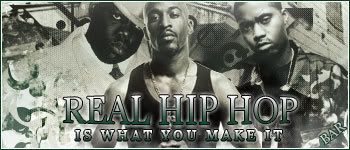hit the rep up ima give rep back as much as possible
Nas may be a little early with hip-hop's obituary, dubbing his new album "Hip-Hop Is Dead" (Def Jam). But he's not that far off.
Hip-hop isn't dead, but it is certainly under fire.
For years, many record labels have run hip-hop like strip miners, willing to promote almost anything in the name of getting paid, regardless of its effects on the music or the culture at large. But like land that has been stripped of all its resources, fan interest in hip-hop hasn't been renewed with much either, as sliding sales and diminishing influence this year show a growing been-there-done-that attitude. advertisement
Now, the music industry is inclined to fix the problem by pushing boundaries: more sex, more drugs, more violence surrounded by more Cristal drunk in larger SUVs on bigger rims by rappers with more bling backed by women in less clothing.
Nas offers a different idea. On "Hip-Hop Is Dead," he not only points out the holes in many rappers' games, he shows how his game is airtight.
"Some of these new rappers got they caps flipped backwards/With they fingers intertwined in some gang sign madness/I got an exam let's see if ya'll pass it/Let's see who can quote a Daddy Kane line the fastest," he raps in "Carry On Tradition," pointing out how one problem with today's hip-hop is that it has little sense of history.
In "Not Going Back," Nas raps about how all the flashy materialism can really be seen as a plot to keep hip-hop artists from converting their cash into actual power through sound investments. And with his wife, Kelis, singing the hook ("Streets keep trying to say come back around this way, I already gone that way I won't go back again"), Nas explains how returning to a gangsta lifestyle after leaving it behind doesn't make much sense.
He teams up with onetime rival Jay-Z on "Black Republican" to rap about beefs (over a beat from "The Godfather: Part II," no less) and create a strong example considering they were caught up in one of hip-hop's most infamous disputes. It's one of several tracks from "Hip-Hop Is Dead" that come over a bit like a lecture, but, in the context of the album, still work out just fine.
Despite its theme, "Hip-Hop Is Dead" does have its lighter moments. Nas delivers "Who Killed It?" as an Edward G. Robinson impersonation, tossing in "Look here, see" and "Sweetheart" in old-time gangster speak as he tries to assess blame for hip-hop's current condition.
However, it is "Can't Forget About You," featuring a jazzy, star-making vocal turn from newcomer Chrisette Michelle and a sample from Nat King Cole's "Unforgettable," where Nas shows that he can take the trappings of the pop-leaning rappers and still say something worthwhile.
With "Hip-Hop Is Dead," Nas makes his long-awaited return to his "Illmatic" form, a move that should boost his career again. More important, though, he does what he can to keep the music he loves alive, insuring that other hip-hoppers can maintain their careers, too.
http://www.azcentral.com/ent/music/arti ... 22nas.html
12/21/06 - Nas offers a history lesson in 'Hip-Hop is Dead'
4 posts
• Page 1 of 1
12/21/06 - Nas offers a history lesson in 'Hip-Hop is Dead'
The Game wrote:Your fanbase knew your gangsta is dying
So i won't stop till that wanksta retire
-

848lu - Renegade

- Posts: 2551
- Joined: Jan 13th, '06, 17:43
- Location: Your Girl-friends House
still waiting for it to be available here..  nice read, thanks
nice read, thanks
 nice read, thanks
nice read, thanksMaybe wrote:I'm so awesome, I don't mind looking desperate.
Chet wrote:Fuck House. If I wanted to watch a sarcastic person in the medical field, I would stalk Yoshi
-

yoshi - Bad Influence

- Posts: 19405
- Joined: Feb 9th, '05, 21:10
- Location: Poland, Warsaw
- Gender: Female
-

,-,'-{Bar}-',-, - Bad Influence

- Posts: 16978
- Joined: Apr 10th, '06, 21:41
- Location: Scotland
- Gender: Male
4 posts
• Page 1 of 1
Who is online
Users browsing this forum: Majestic-12 [Bot]




